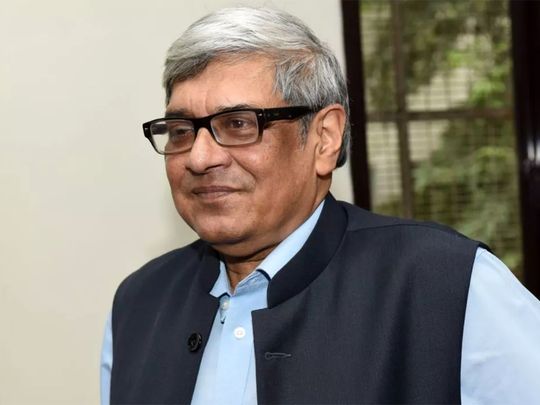
Alas, Bibek-da is no more! He departed from our world on Friday, 1 November. In the very midst of Diwali festivities, outshining the firecrackers that lit up the night sky, he was the brightest shining star on his onward journey to the great beyond. He was only sixty-nine.
The Chair of the Prime Minister’s Economic Advisory Council (PMEAC), he was an eminent economist, intellectual, scholar, and the foremost translator of Sanskrit classics into contemporary English. A friend, philosopher, guide, and mentor to many, he was also a man of convictions, integrity, and character.
Though part of Prime Minister Narendra Modi’s circle of senior civil servants, bureaucrats, and experts, Bibek-da was admired and respected for his expertise in economics and deep understanding of Indian culture by all sides and parties in the political spectrum.
In 2015, he was honoured with the Padma Shri because of his translation of the entire Mahabharata into English. He was only the third person, after Kisari Mohan Ganguli (1896) and Manmatha Nath Dutt (1905), to do so. He also translated the Valmiki Ramayana, Bhagavata Purana, and Harivamsha, all in unabridged versions.
In fact, he was the only one to have translated both the complete Mahabharata and Ramayana into English after the aforementioned polymath, Manmatha Nath Dutt, with whom he believed he had a special connection.
Legendary limericks
Bibek-da also translated several other major puranas, in addition to writing books on a variety of topics, including the Indian Railways. His limericks in Mint were legendary. They continued to appear till the very last days of his life, giving many the false sense of assurance that he was doing well even while he was hospitalised and severely ill.
Many who knew him felt a keen sense of personal loss, but his passing was also marked and mourned by the highest and mightiest of the land. The President of India, Droupadi Murmu, hailed him as an “eminent public intellectual” who had made lasting contributions: “In the demise of Dr Bibek Debroy, the country has lost an eminent public intellectual who enriched diverse fields, from policy making to translating our great scriptures.”
Extending her condolences to his family, friends, and admirers, she added, “His understanding of India’s social, cultural and economic landscape was exceptional.”
Prime Minister Modi, calling him a “towering scholar,” mourned his loss publicly on X: “Dr Bibek Debroy Ji was a towering scholar, well-versed in diverse domains like economics, history, culture, politics, spirituality, and more. Through his works, he left an indelible mark on India’s intellectual landscape.”
A brilliant son of Bengal
From his home state, West Bengal, opposition leader and Chief Minister Mamata Banerjee also condoled his loss: “Saddened by the sudden demise of Bibek Debroy, noted economist and Chairman of PM’s Economic Advisory Council. A brilliant son of Bengal and a scholar of repute, he will be remembered by us.”
Jairam Ramesh, advisor and close confidant of leader of the opposition, Rahul Gandhi, also paid him a handsome tribute: “A man of unusually wide-ranging interests, Bibek Debroy was first and foremost a fine theoretical and empirical economist. His skill for lucid exposition made complex economic issues accessible.”
This is praise indeed, considering that Debroy made a famous and public switch from the Rajiv Gandhi Institute and the Congress ecosystem to the Modi camp in 2005. He showed, through empirical evidence, that the “Gujarat model” under then-Chief Minister Modi was hugely successful, catapulting the state to the top of the economic freedom index of all Indian states. But of his political impact, he had this to say in an auto-obituary he penned in his characteristically exceptional manner just four days before his death: “Had a role in the rat race, was temporarily read and passed into oblivion, buried in journal archives.”
A gifted intellectual
I would, of course, beg to disagree. Bibek-da was one of the most productive, consistent, hardworking, dedicated, and gifted of contemporary Indians. He produced an astonishing body of work, of which the pride of place must go to scores of volumes of translations that he turned out year after year, decade after decade. An approximate estimate of his output would place it possibly upwards of 6 million words, of which the Mahabharata alone accounts for some 2.5 million.
Bibek-da, in the same self-obit, continues, “There are lives my life has touched, improved, even bruised. If they get to know, they may remember, with fondness and bitterness.” At the very end, after discounting both the social and personal, the public and intellectual impact of his life, he ends by concluding, “the only personal loss will be Suparna’s. It matters nothing to anyone else.”
No, Bibek-da. Again, not true. I too, though we knew each other for only a few years, feel your loss keenly. Not only because you and Suparna-di, an extraordinary personality in her own right, were very kind and close to us, but because above and beyond our professional or intellectual connection, there was an unmistakable and not at all trivial bond of love and affection that still—and shall always—remain between us.
Why else would you have dedicated the most personal of all of your books, Manmatha Nath Dutt: Translator Extraordinaire (2020), to my wife and me?










